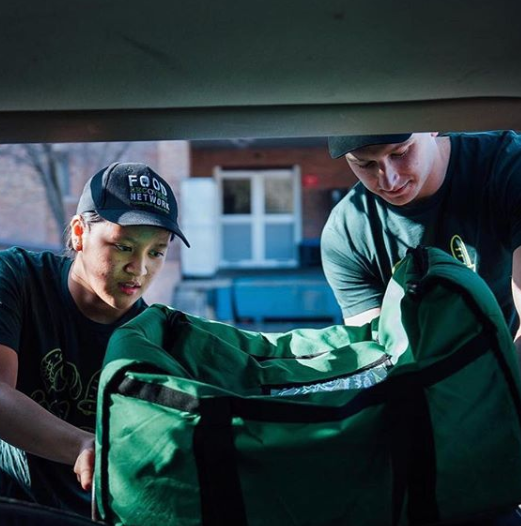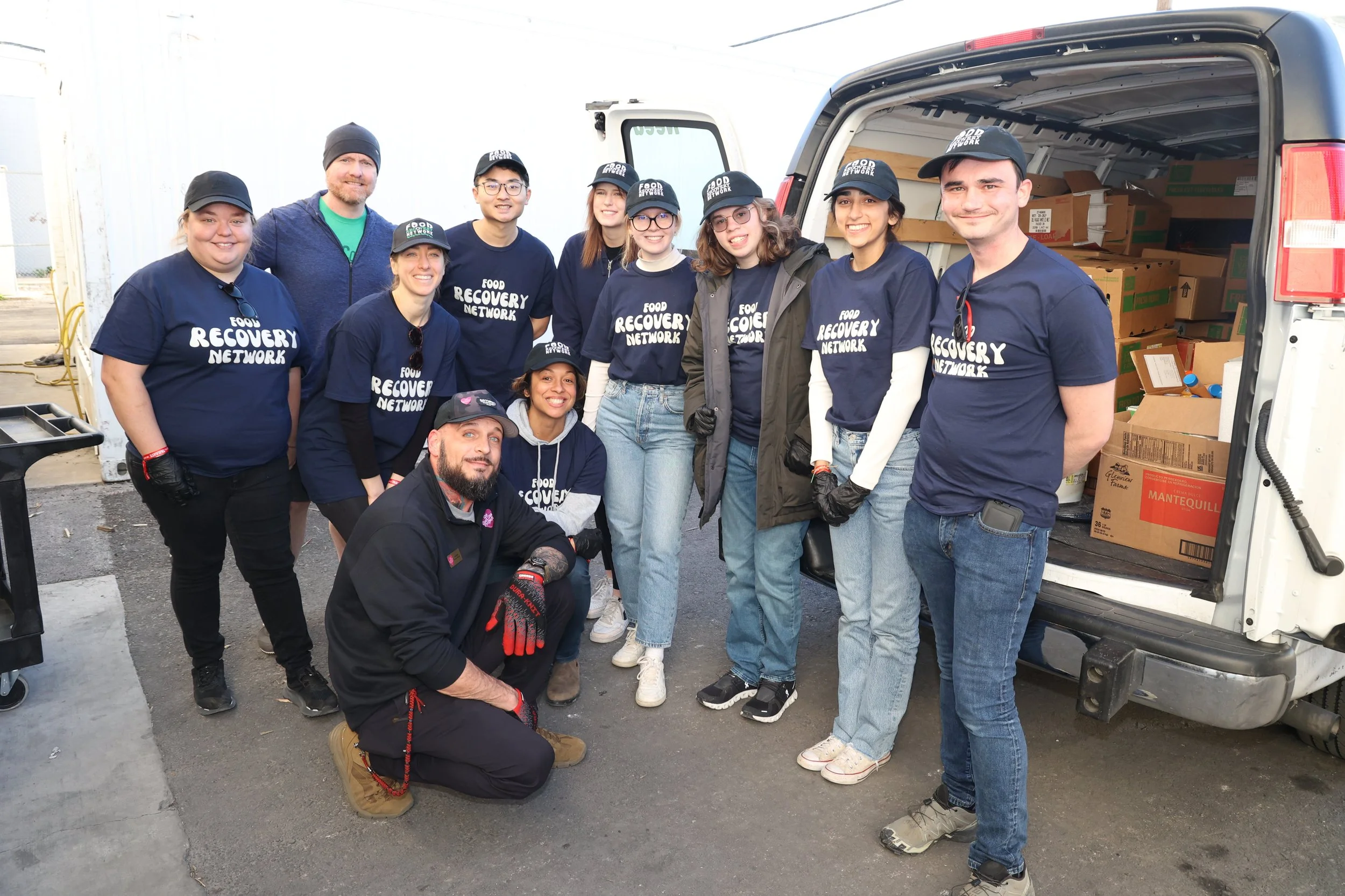On January 23-24, FRN’s Alumni Programs VISTA, Sarah Diamond, and Program and Resource Development Fellow, Paul Sherman, attended Feeding America’s Food Rescue Summit in Washington, D.C. They met with leaders from government agencies, nonprofits, food banks, and food waste startups to discuss the many facets of food rescue. On Day 2 of the summit, they spoke on a panel entitled “Raising Awareness and Creating Advocates Across Generations” with Kris Sadens of ATTN:, Kate MacKenzie of City Harvest, and moderator Blythe Chorn of Deloitte Consulting LLP. They represented FRN and a growing generation of young food waste warriors. After the summit, they worked with the George Washington University FRN chapter to recover 54 pounds of food from the summit and deliver it to the Central Union Mission, one of GW’s partner agencies.
The following are their thoughts on the summit and where they think the movement will go from here.
Sarah Diamond:
The opening speech at Feeding America’s Food Rescue Summit in Washington, D.C. left me with chills. Andy Wilson, the Development Director of Feeding America, the third-largest charity organization in America, talked about work he had done to feed people in Russia during the heart of the Cold War, when more than 70% of the Russian population had fallen into destitute poverty in a matter of months. He was part of the team that delivered huge pallets of perishable and non-perishable food items to people in the heart of Siberia. A pallet of food that was about to pass its expiration date was seen as a potential threat, and, unsure what to do, they decided to bury it so it couldn’t potentially harm people and wouldn’t have to be sent back. The next morning, Andy and his team found that the case had been dug up by local people to eat. It was in that moment that he knew that allowing food to be wasted in a place where people are hungry is a sin like no other.
The point of his story was that excess and destitution should never coexist in the same space — not in the Siberian tundra, not in the United States, not anywhere. Ensuring that food did not go to waste while people are hungry was the theme of the entire summit: companies, food waste organizations, food banks, and governmental employees convened here to discuss how we are going to put a stop to such a harmful yet pervasive issue in this world.
Panelists discussed big questions in the food waste space, such as: how are we going to feed people now while also addressing the root causes of hunger? How do we recover food now, while also realizing that food recovery is more of a band-aid than a long-term solution? What are the implications of all this?
After listening to speakers who have been working in the areas of food waste, hunger, or food recovery for years, I had the opportunity to present my story on a panel. I talked about the time I spent co-leading my Food Recovery Network chapter at Lawrence University in Appleton, Wisconsin, one of the country’s northernmost cities with a population of about 75,000 people. On some days that we dropped off food that would have been thrown away from our dining hall at our partner agencies — we worked with a Boys and Girls club, a homeless shelter, a church, and a soup kitchen — the lobby would be filled with people, doing whatever they could to get out of the below zero temperatures of the harsh upper midwest. My own experiences with food recovery connected back to Andy Wilson’s story in Russia so closely, and it really solidified how stomach-churning and cruel it is to throw out food when there are so many hungry people. I knew it when I saw those lobbies full of people at my partner agencies and I knew it again when I heard Andy speak: eradicating hunger and homelessness will always be my personal and professional bottom lines. In a world that is so full of excess and so full of such great need, it is absolutely our moral obligation to do everything we can to close the gap that exists between them.
Paul Sherman:
Attending Feeding America’s Food Rescue Summit and sharing my experiences in a breakout session reenergized me on several levels. It’s reassuring to know that my generation of anti-food waste advocates is supported by experts from different industries. As I enter the workforce with the intention of ending food waste and combating hunger and food insecurity, it is exciting to know that I am entering a new, emerging field. That said, I also hope this is a dying field; every day, I aim to work myself out of a job. As a young professional, that’s a difficult idea to come to terms with, but a powerful one no less.
I still remember sitting in my dining hall during my freshman year in 2014 at the University of Denver, watching a dining employee take a tray full of chocolate chip cookies at the end of lunch and dumping it in the trash. Even if I wasn’t personally going to eat them, I felt strongly that these cookies should be fed to a person, not a landfill. Today, part of the reason this disturbs me is knowing that the same thing is happening with all different kinds of food: so long as it’s leftover, the understood next step is to throw it away. What I didn’t realize at the time was that I had the ability to affect positive change within the culture that made it acceptable for disposal of surplus food to be the normal course of action.
Four years later, I’m as confident as ever that we can change these destructive behaviors. At the Food Rescue Summit, I learned about innovative ways to combat food waste. For instance, Spoiler Alert makes it easier for food businesses to recover the value from their unsold inventory. By using real-time data, they identify existing waste reduction and diversion efforts while identifying new outlets for food donation. Representatives from the World Wildlife Fund spoke about their efforts to reduce food waste because of its direct negative effects on wildlife across the globe. The 19-year-old in me who was dismayed by a tray of cookies being thrown away would be proud to know that in 2018, companies and organizations are taking this issue to heart.
In his closing presentation, author Jonathan Bloom acknowledged a harsh reality that we in the food rescue movement face: food recovery is temporary. When we are successful in finding an end to wasted food in America, we will need to come up with new ways to combat hunger and food insecurity. Ironically, after two days of discussing food rescue, Bloom warned us against an overemphasis on recycling of food rather than the reduction of wasted food in the first place. Yes, food rescue keeps people fed, but we must be true to both sides of the coin: fighting waste and feeding people. I wonder, what’s next after we address the root causes of wasted food? How can we continue to ensure that hunger and food insecurity are core issues in this movement, even when we don’t have any food to redistribute?
I look forward to continuing to grapple with these questions. I hope that we continue to have conversations with our peers about how to best tackle food waste, hunger, and food insecurity. After all, I think people are finally waking up to the fact that food waste is a tangible and solvable issue, one that we can’t afford to ignore.












